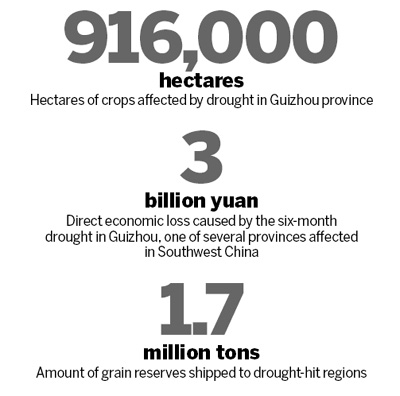Society
Dry spell hits where it hurts
By Wang Huazhong in Guizhou, and Peng Yining and Li Yingqing in Yunnan (China Daily)
Updated: 2010-04-09 07:17
 |
Large Medium Small |
Going up in smoke

Farmers in some regions have already begun to raise seedlings but many are drying out before the rain comes. Among the worst affected is tobacco crops, one of the pillar industries in Yunnan.
The province produces one-third of China's tobacco across about 360,000 hectares, according to the provincial tobacco monopoly bureau, and involves almost two million households. Qian Guancun makes 20,000 yuan a year - almost half of her family's entire income - from his 9 mu (0.6 hectares) of flue-cured tobacco fields in Shilin county. Every spring, she also usually harvests about 300 kg of wheat.
The drought has already destroyed her entire wheat crop and, if the dry spell continues, she fears her tobacco could also be wiped out.
Each week, Qian and her 9-year-old son drive an oxcart 1 km to collect 200 liters of water from the nearest well, "but we can only use this for drinking water", she said. "If there is no rain by May, my tobacco seedlings will be dead."
April 20 to May 10 is the best time to plant tobacco, explained Li Long, director of a tobacco seedlings farm in Shilin. "If farmers miss this time, their yield is seriously reduced also each seedling needs at least 3 liters of water to survive the transplanting process."
Li, whose business provides seedlings to 3,000 farmers, uses greenhouses and irrigation systems to stop seedlings from drying out, and is also building a water link with a nearby reservoir. "But even the reservoir has dried out," he said.
"After we have solved the drinking water problem, we will focus on the protection of the tobacco industry," said Zhang Xuegang, a high-ranking county publicity official.
Even if the rain does come, experts warn there may not be enough villagers left to till the fields, with many young laborers now in cities trying to make up for their drought losses.
More than one million farmers have already left to seek jobs in other provinces, said Xu Haitao, director of the employment bureau under the Guizhou labor and social security department.
China Daily discovered that in several towns in Guizhou, there are very few young laborers left. In one village, a reporter found a 78-year-old man plowing his land.
"I would be better off finding opportunities outside rather than waiting here for rain," said Lu Guangfu in Yizhai. "Almost all the young men have gone. Even when the rain comes, one-fifth of the land in our village will be abandoned."
To cope with the water crisis, Guizhou's agricultural commission has drawn guidelines for the spring cultivation.
Among the suggestions is farmers switching to crops that consume less water, such as corn, potatoes, grains and beans. For those unfamiliar with different crop categories, the commission has sent agricultural experts to the countryside to teach them about the necessary technologies.
"We are encouraging farmers, especially those living by rivers, to cooperatively raise seedlings, while the government is also considering offering subsidies for seedlings that go unused," said commission publicity director Zheng.
However, some are unwilling to play the waiting game.
"My brother-in-law and I cannot go back to growing corn for less profit," said 42-year-old tobacco farmer Ye Qinghong. "If our seedlings do not develop, we will probably join my husband at a factory in Zhejiang province."
---------------------------------------------------------------------------------------------
WEATHER EXPERTS ADMIT DROUGHT MISTAKE
BEIJING - China's meteorological authority this week admitted its failure in forecasting the devastating drought aff ecting more than 61 million people in Southwest China, according to media reports.
“We failed to make a precise forecast on the drought that has lasted so long due to our limited scientifi c and technological levels," Ren Fumin, an offi cial with the National Climate Center, told People's Daily.
Predicting the climate is much more diffi cult than forecasting short-term weather conditions, he said, because the former requires more indicators from the atmosphere or even outer space, such as solar activity.
"Our knowledge about the indicators from the outer atmosphere and their relations with climate change is limited," he said.
In April 1998, Chinese meteorologists accurately predicted the Yangtze River would burst its banks that summer. Such success stories, however, are rare.
"Forecasting the climate remains a major challenge for meteorological departments, although we have been working hard on this over the years," said Yu Xinwen, spokesman for the China Meteorological Administration.
Due to the low accuracy of predications, they are often only provided to government officials, rather than released to the public, he said.
The ongoing drought, the worst in a century, has lingered in Yunnan, Sichuan and Guizhou provinces, Chongqing municipality and the Guangxi Zhuang autonomous region since last September.
The natural disaster has left almost 20 million people, as well as millions of livestock, short of drinking water.
CHINA DAILY







